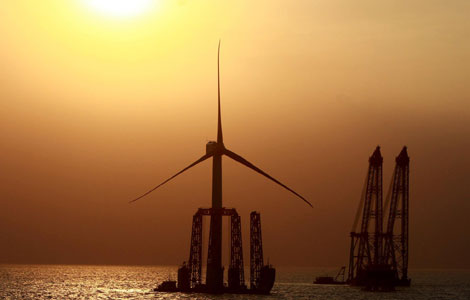Environmental debts
Updated: 2011-09-15 14:48
(China Daily)
|
|||||||||||
With the world's polulations expected to reach seven billion next month, sustainable development has become an ever more urgent issue, one that is intertwined with the challenges of water scarcity, energy shortages, global health issues, food security and so on.
Next year will mark the 20th anniversary of the adoption of the Rio Declaration, which laid out principles to guide sustainable development around the world. Two decades on, however, the planet is facing growing challenges posed by climate change, environmental degradation and the exploding population.
The situation in fast-growing China allows little optimism. In the past months, the Chinese media have been reporting some of the downsides of the country's rapid industrialization: how people's livelihoods, and even lives, are threatened by oil spills, chromium slag and the pollution generated in producing the wildly popular Apple gadgets, to name just a few.
There will be a heavy price to pay to clean up the mess and it will take years for the impaired ecosystems to be fully restored.
Just as Sha Zukang, undersecretary-general of the United Nations said at a high-level symposium in Beijing last week, China's government will need to cautiously balance its economic growth with efforts to reduce its emissions of pollutants.
The country's top leaders have fully recognized the urgent need for green growth. In China's newly issued white paper on peaceful development, "basic safeguards for ensuring sustainable economic and social development" was highlighted as one of the six core national interests.
According to the 12th Five-Year Plan (2011-2015), China has to meet a binding target for carbon intensity reduction and control emissions, and maintain its momentum in improving its energy efficiency.
In a comprehensive work plan on energy conservation and pollution reduction, released last week, the State Council handed down green targets for every province and major State-owned enterprise. It also considered regional caps on coal consumption in regions that are plagued by chronic air pollution.
Achieving these goals is expected to result in a total investment of at least 3 trillion yuan in clean technology, facilities and infrastructure construction, which some experts hope can drive a new round of economic growth.
It is essential for governments at all levels to calculate the real cost of the environmental damage paid for robust growth. Such costs may seem to be bearable at the beginning, but the accumulation of environmental debts cannot be sustained indefinitely. The ultimate goal of sustainable development is to provide people with better livelihoods. But without clean air to breath and safe water to drink, it will not be a better life.













